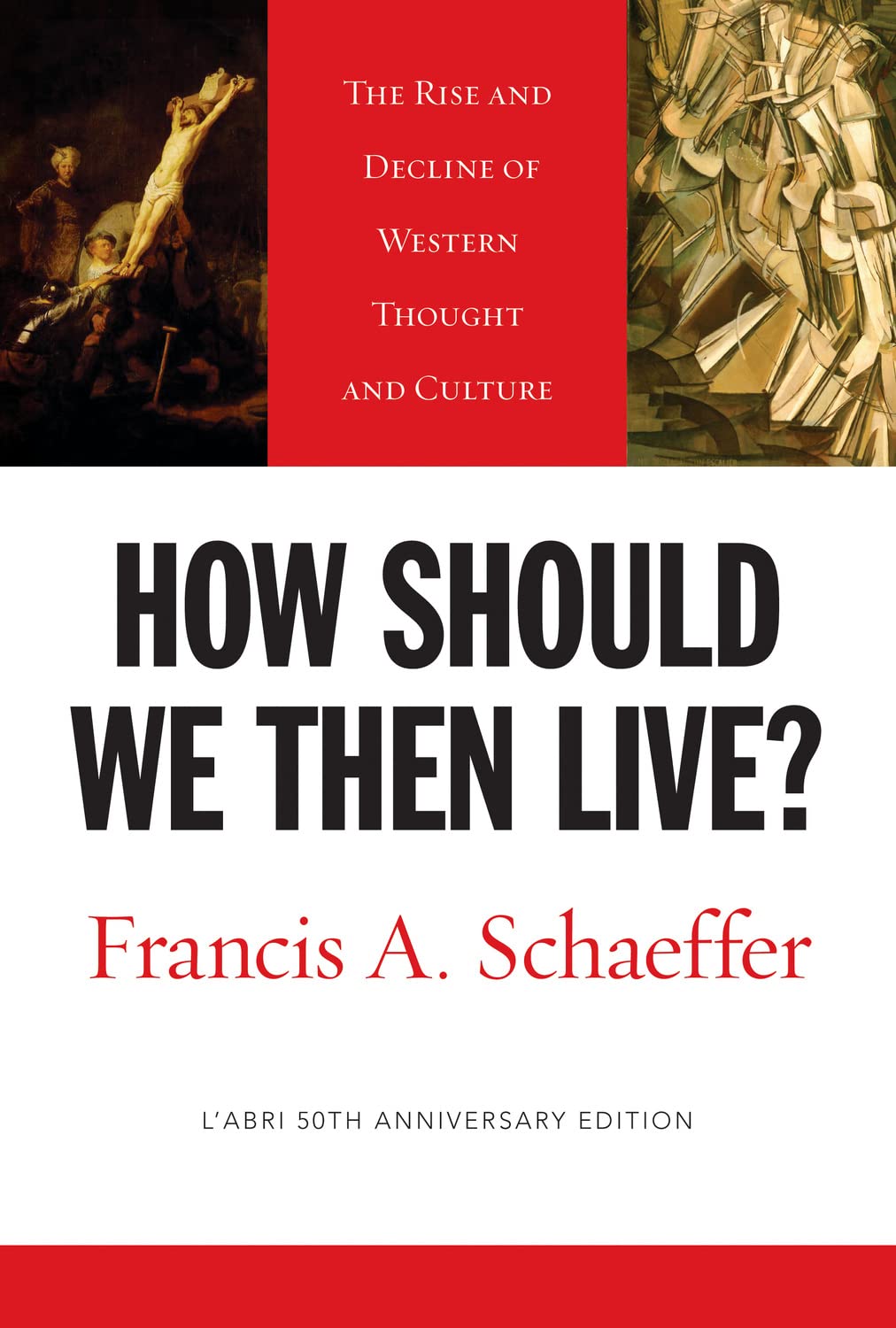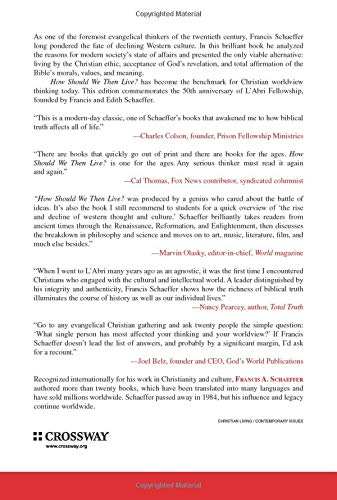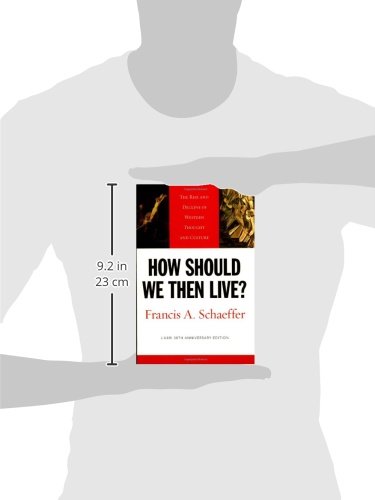Customer Services
Copyright © 2025 Desertcart Holdings Limited
Desert Online General Trading LLC
Dubai, United Arab Emirates




Full description not available
C**I
Should be required reading for every educated person
I needed this book for a graduate course. It was well worth it and will become a part of my permanent library.The focus of Schaefer (2005) is “the rise and decline of western thought and culture”(Schaeffer, 2005). Using examples starting with ancient Rome Schaeffer brings the readerthrough 2000 years of the history of western civilization influenced by Christianity. Some of theinfluences have been positive and some negative. Looking at the current situation what isneeded in society is a dose of the truth. A good dose of the truth can help bring about a worldview that can help bring some sanity back to western civilization. Without truth there mayindeed be a complete collapse of the civilization for which we are a part.The purpose of the text is to examine “the rise and fall of western thought and culture”(Schaeffer, 2005). Schaffer (2005) states in the last sentence of the book that,this book is written in the hope that this generation may turn from that great wickedness,the placing of any created thing in place of the Creator, and that this generation may getits feet out of the paths of death and may live. (p. 258).The intended audience is quite broad. Although there is a distinct Christian perspectivethe book is written to the general population with an overview of how western civilization hasarrived where it is today and the implications of its current state. It is also directed towardsChristians because there is a special note at the end of the book directed specifically at Christiansand what the presentation of the information should mean to them.The thesis of the book is to use the evolution of western culture, philosophy, knowledgeand thought to “present the flow and development which have led to twentieth century thinkingand by so doing hope to show essential answers” (Schaeffer, 2005). This is accomplished bystarting with what has been considered the origin of the western world, ancient Rome.The book is definitely not a study on the global evolution of philosophical and cultural change. It focuses on the western world that has its roots in the Roman Empire. This is the part of the world thathas been the most impacted by Christian thought throughout the centuries more than any otherpart of the world. The bias found within the book is found in Proverbs 1:7 “the fear of the Lordis the beginning of knowledge, but fools despise wisdom and discipline” (New InternationalVersion (NIV)). Another bias also found in Proverbs 13:20 “there is a way that seems right to aman, but in the end it leads to death” (NIV). These versus taken from the Bible are sounddescription of the basis found in the book. The bias is the truth of God.The theoretical assumptions made are directly related to how Christianity has impactedwestern civilization for the past two thousand years. The assumption is that Christianity hasplayed a very large part in the manner in which culture, art, math, science philosophy socialcontract theory and social moral norms have evolved. It has been the organized church that haseither facilitated or put up barriers to change. Another assumption is that although there shouldonly be one truth there are in fact two or more truths that the culture is trying to embracemanage. The spiritual aspects of Christianity and the secular aspects of the culture within acommunity have over time continued to drift apart. Schaeffer explains this as a dichotomy of“two reciprocally exclusive orders” (Schaeffer, 2005, p. 164). He describes this dichotomy asthe description of modern man and this becomes the basis for many of the issues that arediscussed in the book. Modern man has created a “total separation between the area of meaningand values, and the area of reason” (Schaeffer, 2005). This separation has become the dilemmathat modern man has tried to resolve. However there is one ingredient missing from attempt.Proverbs 1:7 clearly states “the fear of the Lord is the beginning of knowledge, but fools despisewisdom and discipline” (New International Version (NIV)). Basically modern man has becomea fool because of the attempt to rationalize the split between values and reason. Without thesource of truth this cannot be rationalized by modern man.Schaeffer (2005) uses as an example of the philosopher Friedrich Nietzsche. Nietzsche“was the first one who said in the modern way that God is dead, and he understood well wherepeople end when they say this” (Schaeffer, 2005). Later in life Nietzsche went insane asSchaeffer (2005) explains “because he understood that insanity was the only philosophic answerif the infinite-personal God does not exist” (p. 180). If society adopts the reasoning that God isdead then meaning and values have no basis nor does reasoning. In the end, it is all disaster.The modern view of thought has become the accepted viewpoint by popular consensus(Schaeffer, 2005, p. 205). As long as people seek personal peace and affluence they will believethey have been successful. The current thought that permeates society is that it is all about theindividual to the detriment of the generation that is following. Alongside that, is the affluencementality that measures success by what I have accumulated in the material world. The bookdiscusses current issues in light of modern thought and these are discussed along with eachhistorical context. These issues include an explanation of how arbitrary judicial decisions have amajor negative impact on the health of society. In addition to judicial arbitrary decisions, mobrule or law by consensus has become the norm. There is no basis for reasoning and thereforewhatever a person wants to do they can make the case that it should be acceptable. As it says inRomans 1:28 “furthermore, since they did not think it worthwhile to retain the knowledge ofGod, he gave them over to a depraved mind, to do what ought not to be done” (NIV). Schaeffer(2005) makes the case for this biblical truth in his discussion of historical and current events.This book is valuable in the study of school law and ethics in that it provides thedocumented basis for how society has evolved to arrive at this point in history. Understandinghistory and how historical events have impacted society allows a contextual view for why thesocietal norms experienced today and why they exist as they do. Jesus told his disciples inMatthew 10:16 “I am sending you out like sheep among wolves. Therefore be as shrewd assnakes and as innocent as doves” (New International Version). It is this admonition by Jesus thatgives a context from which to view the value of this particular book. The better the Christianunderstands the basis for societal norms, including ethics and laws, the better they can be acatalyst for change to help bring light to the truth. Schaeffer (2005) provides the knowledge andcontext required to understand the continuing influx of laws that are not based on any rationalreasoning.It is the manner in which Schaeffer makes his presentation that has the greatest impact and provides the foundation and evidence for a thought that was already held. Overall this book describes exactly how we should live if we intend to have animpact on improving the current decline in western thought and culture. “The problem is havingand acting upon the right world view - the world view which gives men and women the truth ofwhat is” (Schaeffer, 2005, p.254).
S**ﻦ
Schaeffer Checks the Pulse of Western Civilization
As a believer in the risen Christ, life sometimes resembles being stuck in a zombie invasion. Zombies hate living people and desire their destruction. Conversation with zombies can be challenging. Still, Christians are called to live sacrificially sharing their very lives with zombies on the hope that they too can live. Jesus said:For whoever would save his life will lose it, but whoever loses his life for my sake will save it. (Luke 9:24 ESV)While we were still zombies, Jesus died on the cross for us [1].How should we then live?This question taken from Ezekiel 33:10 where Ezekiel reviews his calling as prophet. In the original call statement, Ezekiel writes:Son of man, I have made you a watchman for the house of Israel. Whenever you hear a word from my mouth, you shall give them warning from me. If I say to the wicked, 'You shall surely die,' and you give him no warning, nor speak to warn the wicked from his wicked way, in order to save his life, that wicked person shall die for his iniquity, but his blood I will require at your hand… (Ezekiel 3:17-18 ESV)Ezekiel must prophesy exactly as God instructs or his own salvation is at risk.This watchman motif motivated Francis Schaeffer to write his book—How should we then live? (257-258) He outlines this motif in the final chapter addressed specifically to Christians. The chapter begins with a warning against dichotomous thinking: separating values (non-reason) from reason (255) [2]. This dichotomy has its origins in Greek thought (Platonic dualism; Gnosticism) where the mind (reason) was elevated over the body (values).This re-emergence of dichotomous thinking in the modern era is a Christian heresy, in part, because it rejects the divinity of Christ who was bodily resurrected from the grave. The risen Christ is no ghost (spirit only) and no zombie (body without spirit). Dichotomous thinking (a kind of schizophrenia) leads one to believe that God can only be approached through emotional experiences or, alternatively, only through theology. By contrast, the New Testament teaches unity of mind and body—faith and action [3]. For example, James writes:But be doers of the word, and not hearers only, deceiving yourselves. For if anyone is a hearer of the word and not a doer, he is like a man who looks intently at his natural face in a mirror. For he looks at himself and goes away and at once forgets what he was like. (James 1:22-24 ESV)The splitting of mind and body (or faith from action) robs the Gospel of its power to transform lives and of its moral teaching. By contrast, the resurrection of Christ accredits Jesus’ divinity (Acts 17:31) and lays claim to the whole of us—both our minds and bodies. Schaeffer especially sees dichotomous thinking leaving us to accept authoritarian rule because it facilitates manipulation (256-257).Schaeffer’s point about the manipulative potential of dichotomous thinking is like a bad movie re-run. During the Second World War, for example, economists of the Vienna School justified working for Adolf Hitler through the development of philosophical school called logical positivism. In this paradigm, politicians set the goals and economists simply find the most efficient way to execute them. The guard arguing that he was only following orders when gassing prisoners, for example, is applying logical positivism. In this manner, economists (and prison guards) tried to escape moral judgment by making no judgments at all [4].Schaeffer’s book is a survey of key philosophical developments in history, politics, and art dating back to ancient Rome. It is written in 13 chapters:Ancient Rome;The Middle Ages;The Renaissance;The Reformation;The Reformation—Continued;The Enlightenment;The Rise of Modern Science;The Breakdown in Philosophy and Science;Modern Philosophy and Modern Theology;Modern Art, Music, Literature, and Films;Our Society;Manipulation and the New Elite; andThe Alternatives (7).If you are one of those who think that this is a book written to justify positions of one generation over another, perhaps you should read with particular care.For example, the Renaissance and the Reformation occurred at almost the same time—Renaissance thinkers accepted dichotomous thinking while Reformation thinkers refused to (79-81). Reformation thinkers refused to accept dichotomous thinking and relied on the Bible to discern God’s truth—an absolute standard for ethics. In some sense, the enlightenment simply revisited this same split. Dichotomous thinking remains popular today because it supports humanism and relativism [5].In all his writing, Schaeffer covers a lot of ground. The details of his discussion are fascinating and provide context for understanding the vast changes occurring in our time. Unless you are a student of Western Civilization, be prepared to be challenged. How Should We Then Live? is a classic. Thank you Crossway Books for keeping it in print.[1] For while we were still weak, at the right time Christ died for the ungodly. For one will scarcely die for a righteous person-- though perhaps for a good person one would dare even to die--but God shows his love for us in that while we were still sinners, Christ died for us. (Romans 5:6-8 ESV)[2] Schaeffer felt so strongly about this topic of dichotomous thinking that he wrote an entire book on the subject: Francis Schaeffer. 2006. Escape from Reason: A Penetrating Analysis of Trends in Modern Thinking. Downers Grove: IVP Press.[3] An interesting example of this integrative principle arises in the biblical idea of beauty. “Our modern images feature surface and finish; Old Testament images present structure and character. Modern images are narrow and restrictive; theirs were broad and inclusive…For us beauty is primarily visual; their idea of beauty included sensations of light, color, sound, smell, and even taste” Dyrness, William A. 2001. Visual Faith: Art, Theology, and Worship in Dialogue. Grand Rapids, MI: Baker Academic, page 81.[4] Hannah Arendt studied this problem at great length. For example, read her book: 1987. The Life of the Mind: The Groundbreaking Investigation of How We Think. New York: Harcourt, Inc.[5] In Paul’s Letter to the Galatians he confronts the problem of false teachers who added the Gospel of Christ other teaching. Paul writes: I am astonished that you are so quickly deserting him who called you in the grace of Christ and are turning to a different gospel—not that there is another one, but there are some who trouble you and want to distort the gospel of Christ. (Galatians 1:6-7 ESV) In the Galatian context, the added teaching was over-reliance on the Law of Moses. In our context, the added teaching is primarily philosophical or social.
B**T
Good read
It was a little bit repetative....but I think its a well written, and inciteful assessment of the state of things...I suppose that the only real criticism that I would have, is that Christianity is presented as a cure for the social ills of society, when in fact Christ Jesus is the cure for fallen man, as that man is called by our Father in heaven to the Son. I suppose that if Jesus is the way the truth and the Iife maybe, if he's willing he could be the way the truth and the life for a society as well, but a nation can't really accept Christ for all of it's citizens. But at the end of the book, Francis Schaeffer answers this criticism with a quotation from scripture. Also, this is really not the best book for informing someone of the christian faith, or helping them to Faith in Christ. For that I would recommend Mere Christianity by CS Lewis, and of course the bible.
E**D
A book every Christian should read.
This book is thoughtfully written and gives accurate ans reliable information. It is a classic read for anyone wanting a deeper look into the history of Christianity.
P**)
Prescient in parts a little dated in others, but excellent
Schaeffer is a well known Christian writer and this another excellent contribution. Much of what he talks of provides a good introduction to the subject area. Subsequent academic development in history makes some of it questionable, but in no way wrong or obsolete. His general analysis is convincing, his recommendations are challenging and time has proven him, in a general sense, to be correct. What he predicts, even though it's happening in alternate/different ways, is happening. Well worth reading.
D**S
Un livre vital
Cet ouvrage analyse et met en perspective la chute de la culture et de notre civilisation. En quoi il y'a un rapport avec le décadence d'Onfray à la différence que la base chrétienne de l'auteur lui donne une longueur d'avance et une fondation spirituelle.
K**E
Epochal
Eines der Bücher, die man "epochal" nennen kann.Ein Denker, durchtränkt von verändernder Christusliebe, reflektierender Verantwortung für Kontinente und unbestechlichem Diskurs mit gängigen Meinungen unserer Welt.Längst fällig wäre die E-Buch-Ausgabe in Deutsch (oder habe ich da was übersehen?)kjg
A**D
Very relevant to the world situation today
Francis shows very clearly how every area of society has regressed gradually since the general movement away from belief in God. It’s quite sober the consequences especially in light of recent events
Trustpilot
5 days ago
2 days ago